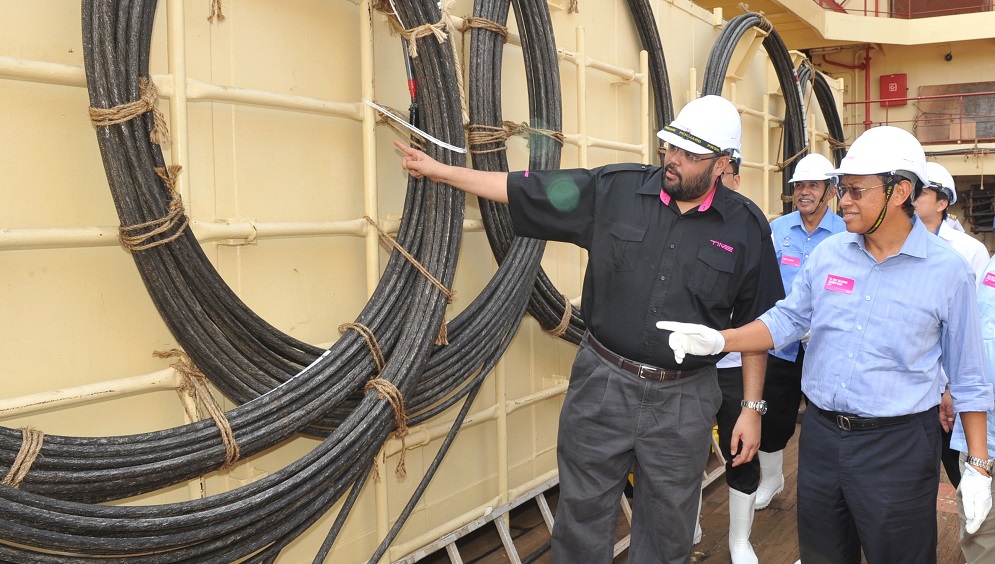TIME invests in Faster to keep pace with IP traffic demand
By Karamjit Singh August 20, 2014
- Helps it position for trans-Pacific and intra-Asia capacity
- Cable investments dictated by strategic value, revenue

ANNOUNCED last week, TIME dotCom Bhd’s stake in the ‘Faster’ transpacific submarine cable system led by Google Inc will cost the Malaysian telco US$56 million (RM179 million).
The cost of the entire cable system, which would be able to carry up to 60 terabytes of data per second, has been estimated at US$300 million, according to an article in the tech news site IEEE Spectrum.
With RM236.8 million cash in hand as of the first quarter of this year, TIME can afford this investment – its second in a cable system involving Google – which will position the company to further capture the seemingly inexhaustible demand for data between the United States and Asia.
For its location between Japan and the United States is the key thing here, beyond the cost of the cable system or how fast or how much traffic it can carry.
Internet Protocol (IP) traffic in the Asia Pacific region is expected to triple in the next four years and Cisco’s latest Virtual Networking Index (VNI) predicts that by 2018, IP traffic in the Asia Pacific region will reach 47.3 exabytes per month.
Attempting to provide some sense of scale to this, the VNI draws an analogy: “In 2018, the gigabyte equivalent of all movies ever made will cross Asia Pacific's IP networks every seven minutes.”
This suits Afzal Abdul Rahim, TIME’s chief executive officer, just fine.
In email responses to questions posed by Digital News Asia (DNA), Afzal highlighted that, “demand for service along the Japan-to-US route has been overwhelming and Faster will allow us to continue supplying much needed trans-Pacific capacity.”
“It will also extend our intra-Asia capacity when the Asia Pacific Gateway, that will link Asean to Japan, is completed,” he added.
Despite sharing his concerns a few months earlier over how brutal margin erosion has been in this space, Afzal says TIME has been happy to increase its capacity along the Asia Pacific region, describing their first tie-up with Google, in the Unity submarine cable system in 2008, as “a hugely successful investment.”
Not surprisingly, he expects the current cable to do just as well as the one from four years ago.
“Like all our other such investments, this is expected to contribute positively to the Group’s earnings upon completion,” he said, declining to offer any revenue projection.
In a research report that came out after the submarine cable deal was announced, Hong Leong Investment Bank described it “a positive development”, with the added benefits of lower cost per unit for the bandwidth it will have available by the projected early 2016 completion date.
In building Faster, TIME is joined by global telecommunications companies KDDI of Japan, China Mobile International, China Telecom Global and SingTel. NEC Corp will be building the cable system. It was also responsible for building the Unity cable.
“The Faster cable system has the largest design capacity ever built on the trans-Pacific route, which is one of the longest routes in the world,” said Woohyong Choi, chairman of Faster’s executive committee, in a press release issued.
With a major deal such as this announced, will TIME take a breather or continue looking to invest in more cable systems or make acquisitions in companies that own cable systems?
According to Afzal, “We are always interested to evaluate opportunities that are in line with the Group’s strategic direction and expansion plans.”
He expressed confidence that TIME’s submarine network will serve the needs of its global customer base and fuel the next stage of growth.
“We tend not to measure our fibre reach by the number of kilometres or terra bits per second, but rather by the strategic value it brings to our business and the RM it brings to our profit and loss as capacity is sold,” Afzal added.
Related Stories:
TIME gets in on APG submarine cable deal
TIME amongst five Asian telcos in Google submarine cable system
Have TIME and TM solved a US$201mil problem?
For more technology news and the latest updates, follow us on Twitter, LinkedIn or Like us on Facebook.


